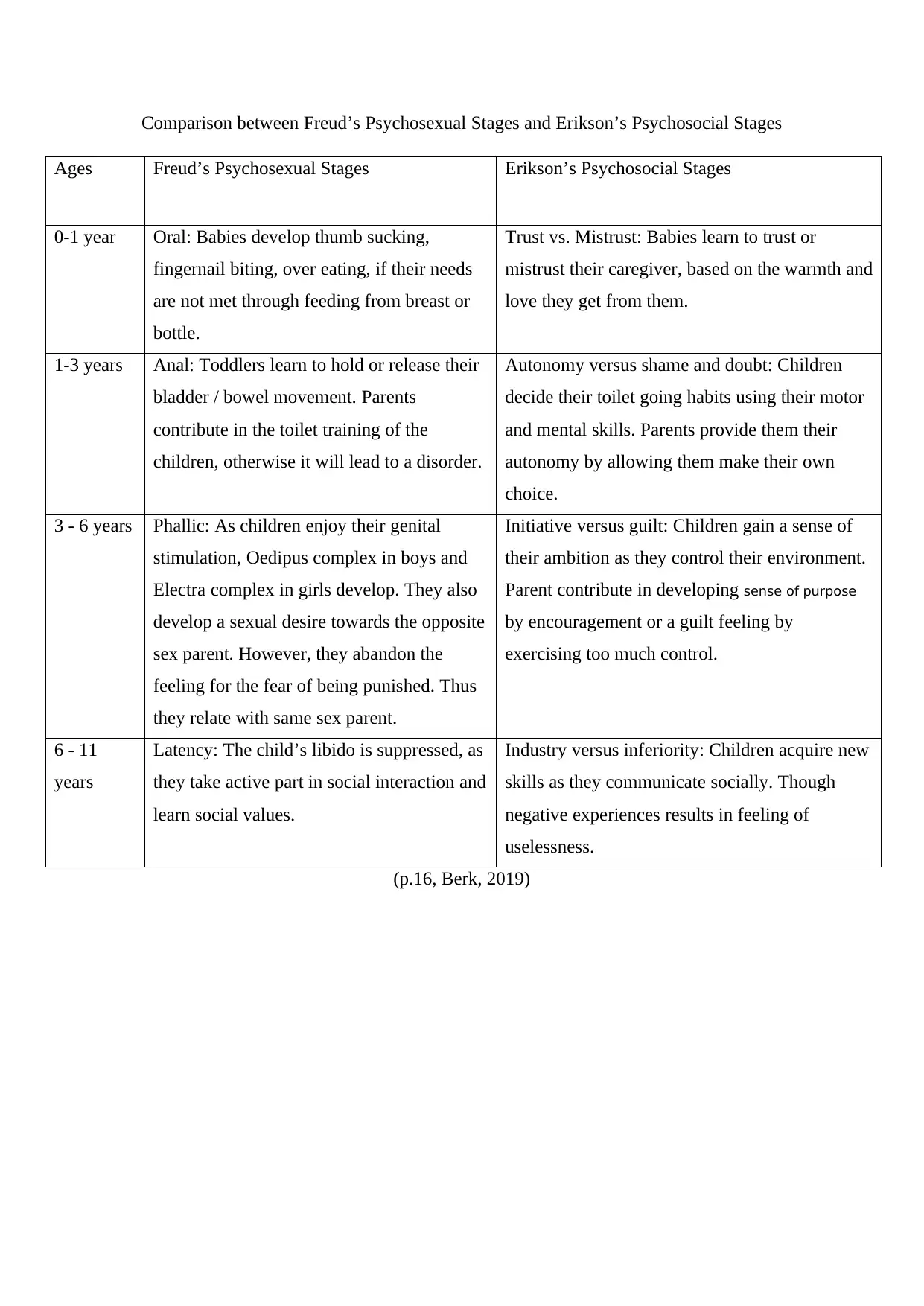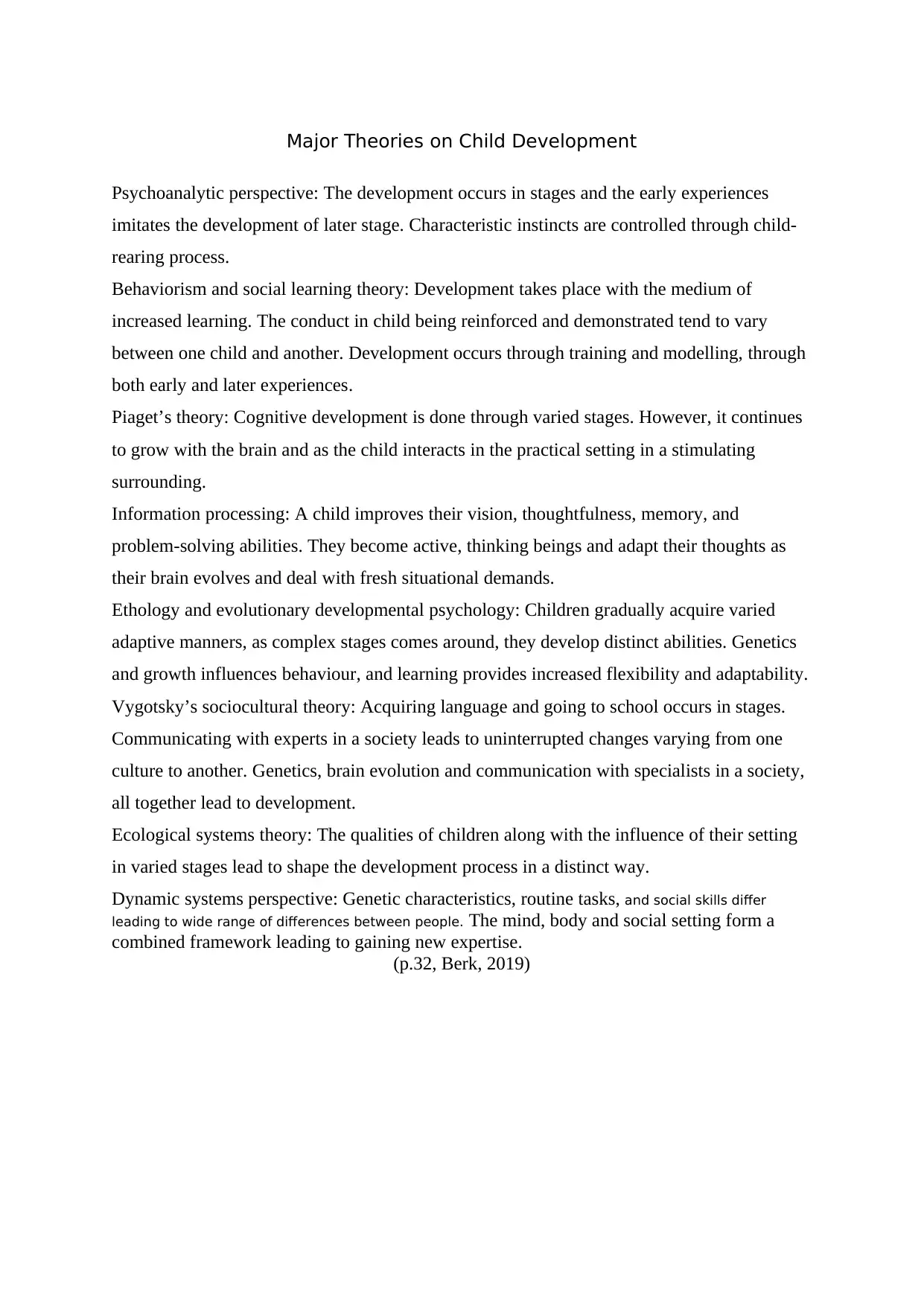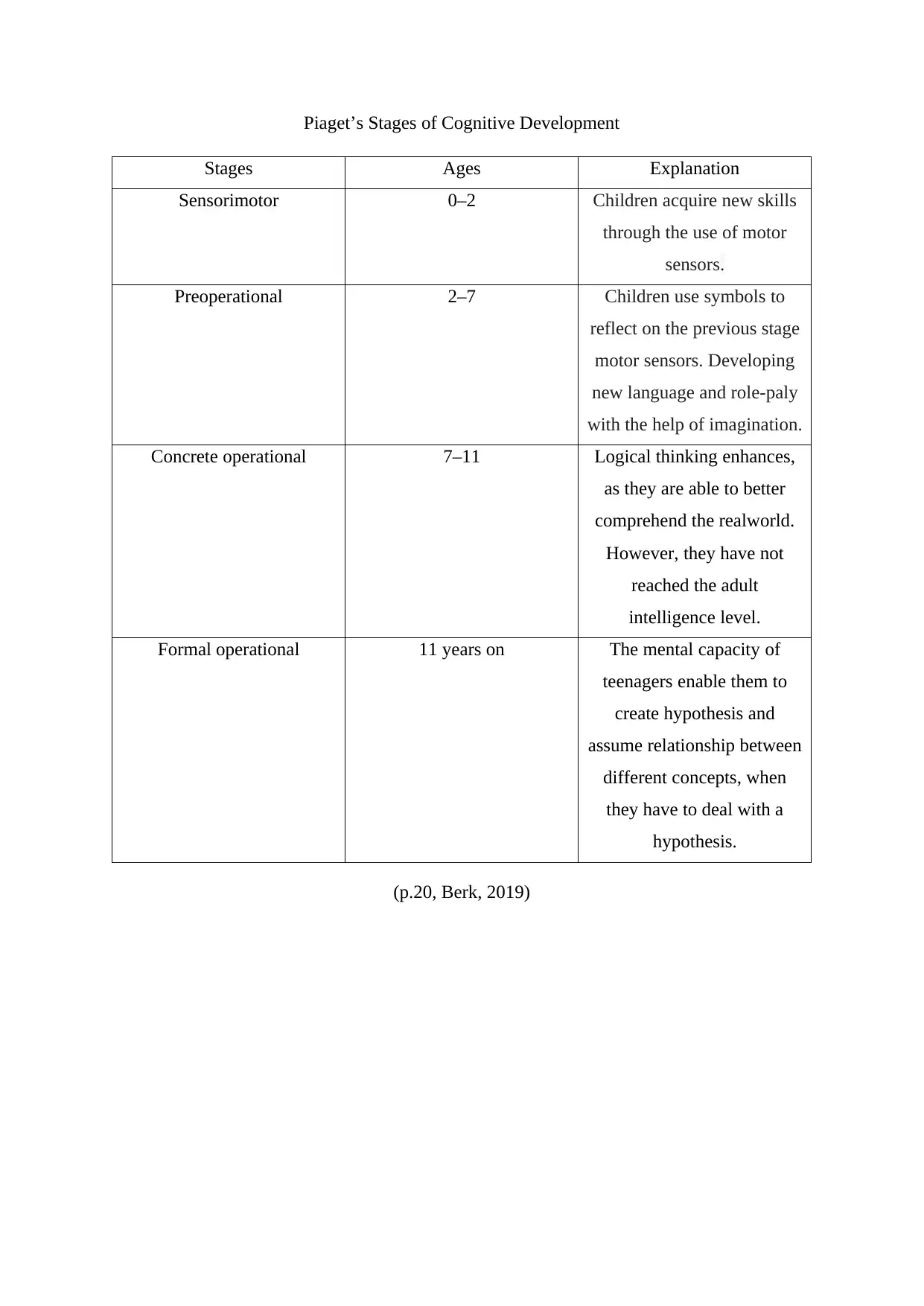A Comparative Study of Freud’s and Erikson’s Development Stages
VerifiedAdded on 2023/04/17
|4
|628
|77
Essay
AI Summary
This essay provides a comparative analysis of Freud's psychosexual stages and Erikson's psychosocial stages of development, outlining the key differences and similarities between their theories. It details each stage in both frameworks, from the oral and trust vs. mistrust stages in infancy to the formal operational and identity vs. role confusion stages in adolescence. Additionally, the essay discusses major theories on child development, including psychoanalytic perspective, behaviorism, Piaget’s theory, information processing, ethology, Vygotsky’s sociocultural theory, ecological systems theory, and dynamic systems perspective, highlighting their influence on understanding how children grow and learn. The document also includes Piaget’s Stages of Cognitive Development.

Comparison between Freud’s Psychosexual Stages and Erikson’s Psychosocial Stages
Ages Freud’s Psychosexual Stages Erikson’s Psychosocial Stages
0-1 year Oral: Babies develop thumb sucking,
fingernail biting, over eating, if their needs
are not met through feeding from breast or
bottle.
Trust vs. Mistrust: Babies learn to trust or
mistrust their caregiver, based on the warmth and
love they get from them.
1-3 years Anal: Toddlers learn to hold or release their
bladder / bowel movement. Parents
contribute in the toilet training of the
children, otherwise it will lead to a disorder.
Autonomy versus shame and doubt: Children
decide their toilet going habits using their motor
and mental skills. Parents provide them their
autonomy by allowing them make their own
choice.
3 - 6 years Phallic: As children enjoy their genital
stimulation, Oedipus complex in boys and
Electra complex in girls develop. They also
develop a sexual desire towards the opposite
sex parent. However, they abandon the
feeling for the fear of being punished. Thus
they relate with same sex parent.
Initiative versus guilt: Children gain a sense of
their ambition as they control their environment.
Parent contribute in developing sense of purpose
by encouragement or a guilt feeling by
exercising too much control.
6 - 11
years
Latency: The child’s libido is suppressed, as
they take active part in social interaction and
learn social values.
Industry versus inferiority: Children acquire new
skills as they communicate socially. Though
negative experiences results in feeling of
uselessness.
(p.16, Berk, 2019)
Ages Freud’s Psychosexual Stages Erikson’s Psychosocial Stages
0-1 year Oral: Babies develop thumb sucking,
fingernail biting, over eating, if their needs
are not met through feeding from breast or
bottle.
Trust vs. Mistrust: Babies learn to trust or
mistrust their caregiver, based on the warmth and
love they get from them.
1-3 years Anal: Toddlers learn to hold or release their
bladder / bowel movement. Parents
contribute in the toilet training of the
children, otherwise it will lead to a disorder.
Autonomy versus shame and doubt: Children
decide their toilet going habits using their motor
and mental skills. Parents provide them their
autonomy by allowing them make their own
choice.
3 - 6 years Phallic: As children enjoy their genital
stimulation, Oedipus complex in boys and
Electra complex in girls develop. They also
develop a sexual desire towards the opposite
sex parent. However, they abandon the
feeling for the fear of being punished. Thus
they relate with same sex parent.
Initiative versus guilt: Children gain a sense of
their ambition as they control their environment.
Parent contribute in developing sense of purpose
by encouragement or a guilt feeling by
exercising too much control.
6 - 11
years
Latency: The child’s libido is suppressed, as
they take active part in social interaction and
learn social values.
Industry versus inferiority: Children acquire new
skills as they communicate socially. Though
negative experiences results in feeling of
uselessness.
(p.16, Berk, 2019)
Paraphrase This Document
Need a fresh take? Get an instant paraphrase of this document with our AI Paraphraser

Major Theories on Child Development
Psychoanalytic perspective: The development occurs in stages and the early experiences
imitates the development of later stage. Characteristic instincts are controlled through child-
rearing process.
Behaviorism and social learning theory: Development takes place with the medium of
increased learning. The conduct in child being reinforced and demonstrated tend to vary
between one child and another. Development occurs through training and modelling, through
both early and later experiences.
Piaget’s theory: Cognitive development is done through varied stages. However, it continues
to grow with the brain and as the child interacts in the practical setting in a stimulating
surrounding.
Information processing: A child improves their vision, thoughtfulness, memory, and
problem-solving abilities. They become active, thinking beings and adapt their thoughts as
their brain evolves and deal with fresh situational demands.
Ethology and evolutionary developmental psychology: Children gradually acquire varied
adaptive manners, as complex stages comes around, they develop distinct abilities. Genetics
and growth influences behaviour, and learning provides increased flexibility and adaptability.
Vygotsky’s sociocultural theory: Acquiring language and going to school occurs in stages.
Communicating with experts in a society leads to uninterrupted changes varying from one
culture to another. Genetics, brain evolution and communication with specialists in a society,
all together lead to development.
Ecological systems theory: The qualities of children along with the influence of their setting
in varied stages lead to shape the development process in a distinct way.
Dynamic systems perspective: Genetic characteristics, routine tasks, and social skills differ
leading to wide range of differences between people. The mind, body and social setting form a
combined framework leading to gaining new expertise.
(p.32, Berk, 2019)
Psychoanalytic perspective: The development occurs in stages and the early experiences
imitates the development of later stage. Characteristic instincts are controlled through child-
rearing process.
Behaviorism and social learning theory: Development takes place with the medium of
increased learning. The conduct in child being reinforced and demonstrated tend to vary
between one child and another. Development occurs through training and modelling, through
both early and later experiences.
Piaget’s theory: Cognitive development is done through varied stages. However, it continues
to grow with the brain and as the child interacts in the practical setting in a stimulating
surrounding.
Information processing: A child improves their vision, thoughtfulness, memory, and
problem-solving abilities. They become active, thinking beings and adapt their thoughts as
their brain evolves and deal with fresh situational demands.
Ethology and evolutionary developmental psychology: Children gradually acquire varied
adaptive manners, as complex stages comes around, they develop distinct abilities. Genetics
and growth influences behaviour, and learning provides increased flexibility and adaptability.
Vygotsky’s sociocultural theory: Acquiring language and going to school occurs in stages.
Communicating with experts in a society leads to uninterrupted changes varying from one
culture to another. Genetics, brain evolution and communication with specialists in a society,
all together lead to development.
Ecological systems theory: The qualities of children along with the influence of their setting
in varied stages lead to shape the development process in a distinct way.
Dynamic systems perspective: Genetic characteristics, routine tasks, and social skills differ
leading to wide range of differences between people. The mind, body and social setting form a
combined framework leading to gaining new expertise.
(p.32, Berk, 2019)

Piaget’s Stages of Cognitive Development
Stages Ages Explanation
Sensorimotor 0–2 Children acquire new skills
through the use of motor
sensors.
Preoperational 2–7 Children use symbols to
reflect on the previous stage
motor sensors. Developing
new language and role-paly
with the help of imagination.
Concrete operational 7–11 Logical thinking enhances,
as they are able to better
comprehend the realworld.
However, they have not
reached the adult
intelligence level.
Formal operational 11 years on The mental capacity of
teenagers enable them to
create hypothesis and
assume relationship between
different concepts, when
they have to deal with a
hypothesis.
(p.20, Berk, 2019)
Stages Ages Explanation
Sensorimotor 0–2 Children acquire new skills
through the use of motor
sensors.
Preoperational 2–7 Children use symbols to
reflect on the previous stage
motor sensors. Developing
new language and role-paly
with the help of imagination.
Concrete operational 7–11 Logical thinking enhances,
as they are able to better
comprehend the realworld.
However, they have not
reached the adult
intelligence level.
Formal operational 11 years on The mental capacity of
teenagers enable them to
create hypothesis and
assume relationship between
different concepts, when
they have to deal with a
hypothesis.
(p.20, Berk, 2019)
⊘ This is a preview!⊘
Do you want full access?
Subscribe today to unlock all pages.

Trusted by 1+ million students worldwide

Reference
Berk, L. (2019). Child Development. 9th ed. London: Pearson Education, Inc.
Berk, L. (2019). Child Development. 9th ed. London: Pearson Education, Inc.
1 out of 4
Related Documents
Your All-in-One AI-Powered Toolkit for Academic Success.
+13062052269
info@desklib.com
Available 24*7 on WhatsApp / Email
![[object Object]](/_next/static/media/star-bottom.7253800d.svg)
Unlock your academic potential
Copyright © 2020–2026 A2Z Services. All Rights Reserved. Developed and managed by ZUCOL.





